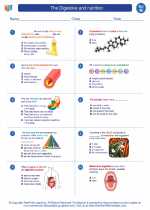Social Behavior
Social behavior refers to the interactions and relationships between organisms of the same species. It encompasses a wide range of behaviors such as communication, cooperation, competition, mating, and parenting. Social behavior plays a crucial role in the survival and reproduction of many species.
Types of Social Behavior
There are several types of social behavior observed in animals:
- Communication: Animals use various signals, such as sounds, body language, and chemical cues, to convey information to others in their group.
- Cooperation: Some species work together to achieve common goals, such as hunting, foraging, or raising offspring.
- Competition: Individuals within a group may compete for resources, such as food, mates, or territory.
- Parental Care: Many species exhibit parental care behaviors to ensure the survival of their offspring.
- Aggression: Interactions between individuals may involve aggressive behaviors, especially when defending territory or establishing dominance.
Factors Influencing Social Behavior
Several factors can influence social behavior in animals:
- Genetics: Genetic factors can play a role in determining an individual's social behavior, including their tendency to be more social or solitary.
- Environment: The physical and social environment in which an organism lives can significantly impact its social behavior.
- Learning and Experience: Animals can learn social behaviors through observation and experience, shaping their interactions with others.
- Hormones: Hormonal influences, such as the presence of certain chemicals in the body, can affect social behavior, particularly in relation to mating and aggression.
Significance of Social Behavior
Social behavior has several key implications for the survival and evolution of species:
- Increased Fitness: Cooperative behaviors can enhance the survival and reproductive success of individuals within a group.
- Resource Acquisition: Social interactions can facilitate the acquisition and sharing of resources, ensuring the well-being of the group.
- Communication and Coordination: Social behavior enables effective communication and coordination among group members, improving their ability to respond to environmental challenges.
- Conflict Resolution: Social interactions provide mechanisms for resolving conflicts and establishing social hierarchies within a group.
Study Guide
To better understand social behavior, consider exploring the following topics:
- Examples of social behavior in different animal species
- The role of genes and environment in shaping social behavior
- The impact of social behavior on population dynamics and community structure
- Comparative studies of social behavior across different species
- The influence of social behavior on conservation and management of wildlife
By delving into these areas, you can gain a comprehensive understanding of the fascinating world of social behavior in the animal kingdom.
.◂Science Worksheets and Study Guides Eighth Grade. The Digestive System & Nutrition
Study Guide The Digestive and nutrition
The Digestive and nutrition  Worksheet/Answer key
Worksheet/Answer key The Digestive and nutrition
The Digestive and nutrition  Worksheet/Answer key
Worksheet/Answer key The Digestive and nutrition
The Digestive and nutrition  Worksheet/Answer key
Worksheet/Answer key The Digestive and nutrition
The Digestive and nutrition  Vocabulary/Answer key
Vocabulary/Answer key The Digestive and nutrition
The Digestive and nutrition  Vocabulary/Answer key
Vocabulary/Answer key The Digestive and nutrition
The Digestive and nutrition  Vocabulary/Answer key
Vocabulary/Answer key The Digestive and nutrition
The Digestive and nutrition  Vocabulary/Answer key
Vocabulary/Answer key The Digestive and nutrition
The Digestive and nutrition  Vocabulary/Answer key
Vocabulary/Answer key The Digestive and nutrition
The Digestive and nutrition 

 Worksheet/Answer key
Worksheet/Answer key
 Worksheet/Answer key
Worksheet/Answer key
 Worksheet/Answer key
Worksheet/Answer key
 Vocabulary/Answer key
Vocabulary/Answer key
 Vocabulary/Answer key
Vocabulary/Answer key
 Vocabulary/Answer key
Vocabulary/Answer key
 Vocabulary/Answer key
Vocabulary/Answer key
 Vocabulary/Answer key
Vocabulary/Answer key

The resources above cover the following skills:
Reading Standards for Literacy in Science and Technical Subjects
Craft and Structure
Determine the meaning of symbols, key terms, and other domain-specific words and phrases as they are used in a specific scientific or technical context relevant to grades 6-8 texts and topics.